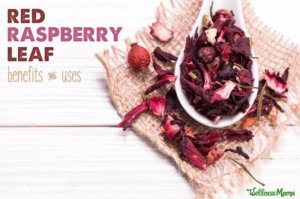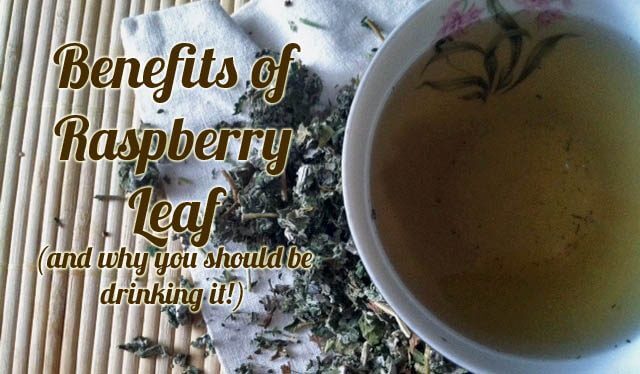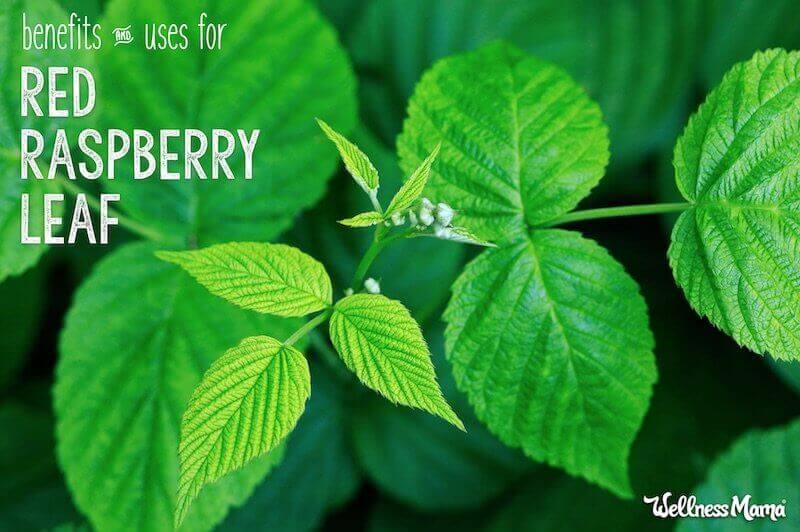Raspberry leaf is probably my favorite herb and definitely the one I consume the most because of its amazing nutrient profile. I even use it in my homemade multivitamin tincture.
While the taste is nothing like raspberries, it has gentle taste similar to regular black tea (but without the caffeine).
Raspberry leaf is generally known for its benefits during pregnancy, but its nutrient profile makes it an excellent choice for women at any stage of life as it helps support female health in many ways.
Here’s why!
Why Use Raspberry Leaf?
As its name suggests, raspberry leaf is the leaf of the raspberry plant. Also known as “the woman’s herb,” it is naturally high in vitamins and minerals we need for female health specifically: magnesium, potassium, iron, calcium, and vitamins B, A, C, and E. The high level of B vitamins in particular makes it useful for relieving nausea, soothing leg cramps, and improving sleep. (Symptoms that definitely increase during pregnancy!)
Immune Support
The high concentration of vitamin C in raspberry leaf makes it great during illness and I use it in a variety of my favorite herbal tea recipes for immune support during sickness. It’s soothing and tasty (and the fact that it’s safe to give to kids really helps!). I explain why a little extra vitamin C support is good for health here.
Pregnancy and Labor
The specific combination of nutrients in raspberry leaf makes it extremely beneficial for the female reproductive system. It strengthens the uterus and pelvic muscles which some midwives say leads to shorter and easier labors.
This study published in a midwifery journal gives some support to the anecdotal evidence. In a control group of 108 women, about 50% took red raspberry leaf throughout the pregnancy. In their words, the result seem to indicate that “women who ingest raspberry leaf might be less likely to receive an artificial rupture of their membranes, or require a caesarean section, forceps or vacuum birth than the women in the control group.”
I personally use it as a tea throughout pregnancy, even in the first trimester, as I’ve never seen any conclusive reason not to and the health benefits are wonderful during pregnancy, but I’d definitely consult a midwife or doctor before taking any herb while pregnant.
I also use it in this herbal tea blend for nursing moms. It’s a great choice at this time because of its safety profile and flavor, not to mention its other benefits.
Female Health
As I mentioned, red raspberry leaf isn’t just for pregnant women. Many women claim it helps ease the symptoms of PMS, endometriosis, and menopause, and some couples find it helpful when trying to conceive. This is due to its high vitamin and mineral content, which helps balance hormones and strengthens the walls of uterus and the general pelvic area. Because these nutrients are coming from a food-based source, they are highly absorbable and better than a supplement (in my opinion!).
Dental Health
The tannins in raspberry leaf give it astringent properties which make it soothing both internally and externally. A strong raspberry leaf tea or tincture will sooth sunburn, eczema, and rashes when used externally. Swishing with a tincture or infusion of raspberry leaf is great for the gums and can help alleviate the symptoms of gingivitis or gum disease.
How to Take Red Raspberry Leaf
I like to take this mainly as an herbal tea, which I drink iced in the summer and hot in the winter. I also make a pregnancy tea using 4 parts raspberry leaf and 1 part nettle leaf. You can also add 1 part peppermint leaf for help with nausea during early pregnancy.
For those trying to improve fertility, it is recommended to consume three or more cups daily. I also consume this amount during pregnancy. It tastes very similar to regular tea without the caffeine, which makes it wonderful in the evening. If you’re a tea drinker, consider adding this in place of regular tea.
How to Brew Raspberry Leaf Tea
Pour 8 ounces of boiling water over 1 teaspoon to 1 tablespoon of raspberry leaf (depending on how strong you like your tea). Steep, covered, for at least 5 minutes and drink as regular tea.
I often keep a gallon of cold raspberry leaf tea in the fridge so that I don’t have to brew by the cup. To make a gallon, just use 3/4 to 1 cup of raspberry leaf per gallon of boiling water. I pour the herbs and boiling water into a gallon glass jar, cover with a plate, and leave overnight before straining for a strong tea.
Starting off with one cup per day and then keeping consumption to no more than 3 cups in a day is recommended.
Check out my favorite herbal tea blends here … many of them include raspberry leaf!
How to Make a Tincture
You can also make a tincture of raspberry leaf using the same proportions that you use to make chamomile tincture. This is great for the skin if used externally and to help alleviate PMS, menstrual troubles, heavy bleeding and infertility when used internally.
Is It Safe for Pregnancy?
 In the health world there must, of course, always be some controversy, so it’s worth mentioning that some sources recommended avoiding raspberry leaf in the first trimester.
In the health world there must, of course, always be some controversy, so it’s worth mentioning that some sources recommended avoiding raspberry leaf in the first trimester.
Though I’ve used red raspberry leaf in all of my pregnancies without a problem, some speculate that it shouldn’t be used until later in the pregnancy, thinking that there could be a risk of miscarriage. I’ve never found any evidence of it being a problem, but of course, any pregnant woman should consult her own doctor or midwife before taking anything during pregnancy.
This article explains where some of this speculation comes from:
Some medical and popular media make reference to raspberry leaf tea as something to avoid during pregnancy for risk of miscarriage. This notion stems from a study conducted in 1954 where fractions were isolated from Rubus sp. and applied in vitro to the uterine tissues of guinea pigs and frogs. The scientists discovered such things as one fraction acted as a spasmolytic whereas another caused uterine contractions. Herein lies the risk of isolating the parts of a whole. When used as a whole plant, neither action is exacerbated and the herb is deemed safe. If a mother is prone to miscarriages she may feel safer avoiding raspberry until the third trimester. This is an herb with centuries of safe use behind it, there is usually little cause for concern.
To date there is little clinical data on the safety of herbs during pregnancy, but the anecdotal evidence and long history of use in many cultures seems to indicate raspberry leaf is quite safe.
Where to Buy Raspberry Leaf
I order dried raspberry leaf in bulk to make into tea, infusions, or tinctures. We go through a bag pretty quickly since my kids love it too!
Try red raspberry leaf tea as your tasty new nightcap or in your favorite herbal blend. It’s a delicious addition to your herbal remedy cabinet and one I highly recommend in or outside of pregnancy.
This article was medically reviewed by Dr. Betsy Greenleaf, the first board certified female urogynecologist in the United States. She is double board certified in Obstetrics and Gynecology, as well as Female Pelvic Medicine and Reconstructive Surgery. As always, this is not personal medical advice and we recommend that you talk with your doctor.
Do you use raspberry leaf? Ready to start? Share below!





Leave a Reply